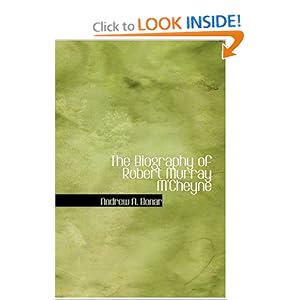
Takeaway: Classic Christian biographies are well worth reading to show us what God has done before us, even if they occasionally fall into hagiography.
One of the significant benefits of ereaders is that anything in public domain is essentially free. Want to read Little Women, you can read it for free. Want to read Anna Karenina, Hunchback of Notre Dame, Tom Sawyer or a gazillion other classics. They are pretty much all free. If you have a kindle, Amazon has many of them in the kindle book store. If you do not find them or they are not free, try Project Gutenberg. Project Guenberg has the goal of digitizing all public domain books. And then there is the Google book project, that is trying to digitize every book known to man. But I am not going to get into that.
The Biography of Robert Murray M’Cheyne (this is the link to the actual version I read) is a biography of a Scottish pastor (1813-1843). I was only aware of him because one of my professors in college gave out M’Cheyne’s bible reading calendar. The plan calls for reading the New Testament and Psalms twice in a year and the Old Testament once. It is usually four chapters, in four different books in a day (ideally it is two chapter in the morning and two in the evening and one of those sessions should be read with others.)
Classic Christian biographies like this usually provoke two reactions. And this one was no different. One, I often take many things about modern life and my faith for granted. M’Cheyne was part of a group of Presbyterians that investigated missions to the Middle East and what become Israel. (The author of this biography, Andrew Bonar was on the same trip.) M’Cheyne’s devotion and desire to serve God was quite evident. He was serious and what he left behind (he died when he was 29 years old) really encourages me to push harder.
I also am reminded to how far we have come. Both in this biography and the earlier one I read of EM Bounds detailed internal denominational fights about whether traveling evangelists were appropriate and biblical. That is an arguement that is long gone. In the same fashion, basic health care was fairly limited and only 150 years ago many people died of quite preventable diseases. M’Cheyne died of Typhus.
The other reaction that I usually have to classic Christian biographies is distaste of Hagiography. Hagiography is the study of saints and usually refers to the way that many of these biographies are openly reverential to their subject and rarely include anything that might show a negative side of the subject. About half of this biography is direct quotes from M’Cheyne’s biography. Some of this is quite fascinating. But much of it is heavily edited and hard to really get a sense of what is going on. But on the less cynical side, M’Cheyne’s devotion and sense of purpose is inspiring.
While M’Cheyne was in Israel, a revival broke out in his parish and the surrounding area. M’Cheyne attributed the revival to prayer and the grace of God. There is a fair amount of detail about the revival and it is clear from the biography that M’Cheyne attributed it to grace of God, but many others attributed it to M’Cheyne’s prayers.
The last section is about 10 pages written by M’Cheyne about what he had learned about the Christian life. This was somewhat hard to read, but quite good once you worked through it.
Overall, this was not one of my favorite classic Christian biographies. But I did not know much about M’Cheyne other than the bible reading calendar, so the extra I learned was worthwhile. And it was free. It is hard to beat free.